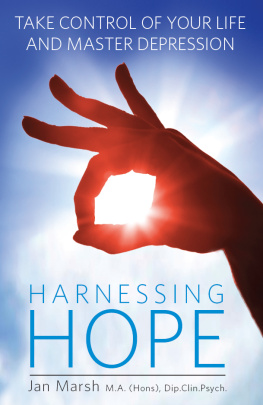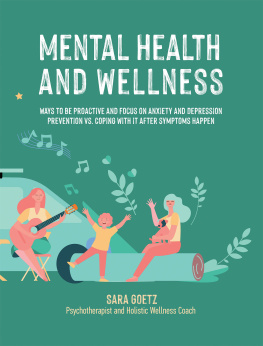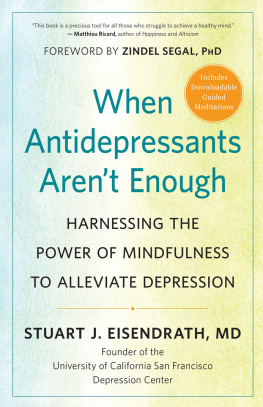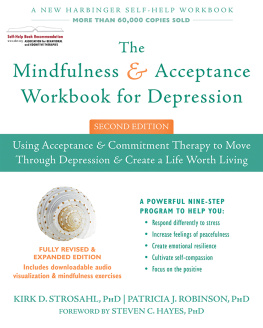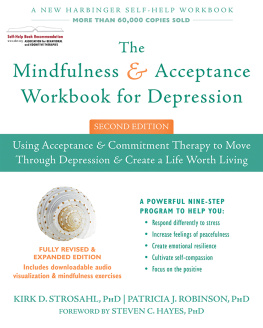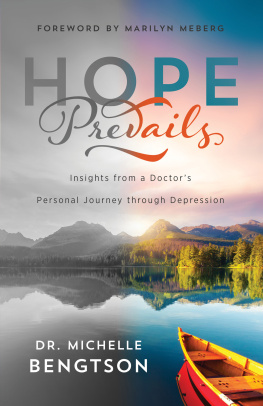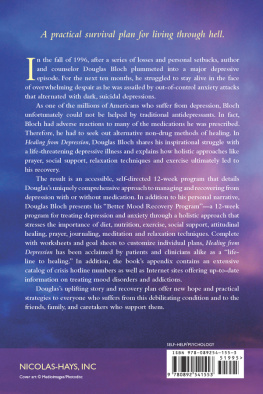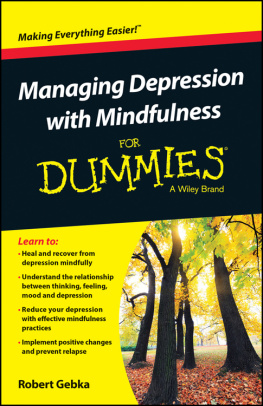ABOUT THE AUTHOR
Jan Marsh M.A. (Hons), Dip.Clin.Psych. is a clinical psychologist with 40 years experience. She has worked with clients from all walks of life and is familiar with a wide range of effective treatments for depression. After many years of service in the public system, including some management and teaching roles, Jan has been in private practice for over a decade.
Acknowledgements
Thank you to my colleagues, fellow writers and clients who have shared their wisdom and experience with me, especially to those who gave positive feedback on the first version of this book and encouraged me to take it further. To Lionel Padial, Lorinda Shaw and Dr Anna Clarkson who fearlessly critiqued my revisions in the light of their expertise, I am grateful and indebted.
Appendix: Useful tables
Table for scheduling weekly activities (see for a completed example)

Table for helping you to clarify your thoughts (see for a completed example).
| Problem | Vulnerable thinking | Resilient thinking |
|
|
|
Mental chit-chat The thoughts that block you or help you |
Beliefs What are the underlying beliefs and emotions? |
Consequences What will happen if I follow my thoughts? |
Bibliography
Aldridge, Susan (2000), Seeing Red and Feeling Blue: A new understanding of mood and emotion , Arrow, London
Armstrong, Karen (2011), Twelve Steps to a Compassionate Life , The Bodley Head, London
Gilbert, Paul (1997), Overcoming Depression: A self-help guide using CognitiveBehavioural Techniques , Robinson, London
Gilbert, Paul (2009), The Compassionate Mind , Constable and Robertson, London
Greenberger, D and Padesky, C (1995), Mind Over Mood: Change how you feel by changing the way you think , Guilford Press, United Kingdom
Hanson, Rick (2011), Just One Thing , New Harbinger, Oakland
Leonard, George (1992), Mastery: The keys to success and longterm fulfilment , Plume, New York
McKenzie, Stephen and Hassed, Craig (2014), Mindfulness for Life , Exisle Publishing, New South Wales
Sapolsky, Robert (2002), A Primates Memoir: Love, death and baboons in East Africa , Vintage, London
Skellett, Chris (2012), When Happiness is Not Enough , Exisle Publishing, New South Wales
Skellett, Chris (2014), The Power of the Second Question , Exisle Publishing, New South Wales
Smith, Gwendoline (1995), Sharing the Load: What to do when someone you love is depressed , Random House, New Zealand
Solomon, Andrew (2001), The Noonday Demon: An anatomy of depression , Chatto and Windus, London
Williams, Mark and Penman, Danny (2011), Mindfulness: Finding peace in a frantic world , Piatkus, London
Williams, Mark, Teasdale, John, Segal, Zindel, Kabat-Zinn, Jon (2007), The Mindful Way through Depression , Guilford Press, United Kingdom

What is going on?
You wake at four in the morning and stare into the darkness, thinking of all the things that are wrong with your life and the world. You feel certain that it has always been so and the times you thought otherwise you were fooling yourself.
Just as it starts to get light you doze off and when the alarm rings you surface with difficulty from a blank, unrefreshing sleep.
Then you might do one of the following. Pull the blankets over your head and stay in bed until midday when you get up, watch the soaps without remembering anything about them and forget to eat. Drag yourself out to face the day, put on a brave face at work and hope no one notices how often you go to the toilets to cry. Appear in the kitchen in your pyjamas, shout at the family and, when everyone is upset, throw on some clothes and storm off. Get up and drive round until the pub opens then settle in to drink yourself numb.
You ask: Whats the matter with me? Is it just me?
This could be depression and, no, its not just you.
Depression is not something that happens to people who are weak or crazy. It is everywhere and it can affect anyone.
Scientists talk about a worldwide epidemic of depression. Often referred to as the common cold of emotional problems, depression is the subject of much study and concern. One in seven people will suffer from an episode of depression in their lifetime, and for women the rate is higher, up to one in five, although accurate figures are hard to establish due to variations in different cultures and age groups. Rates of depression are calculated by interviewing people from large random samples and establishing the level of their mood by using standard questions.
The reason for the gender difference in depression rates reported to such interviewers is not clear. Perhaps women are more ready to acknowledge feelings of hopelessness and self-criticism, while men mask their depression with other problems such as alcohol abuse and anger. Only about half of those who experience depression seek help, even though after an initial episode the chance of a recurrence is high.
The cost to society in terms of loss of productive work, damage to relationships and the effect on families is considerable. Depression is the leading cause of suicide, which is why it is so important to recognise and treat it promptly.
Throughout this section we will meet some people who have come to terms with depression. We will get to know them as they make changes in order to manage their low mood and improve their lives.
 | CASE STUDY |
| Laura, aged thirty-two |
I was brought up in a strict, religious family. We went to church every Sunday and had Bible study during the week. I was a timid child, and I was sure that God was watching and finding fault with me all the time. My mother certainly was. She had a terrible temper and would beat my brother and me with a wooden paddle for the slightest offence. She would also say that we made God unhappy. I tried very hard but I could never please her. I loved my father, but he seemed scared of her too and didnt stand up for us.
I was a nerdy teenager who wore dowdy clothes and wasnt allowed to go to parties or dances. I had friends at school but because I couldnt socialize with them after school they werent close friends.
When I left home to go to university I was a fish out of water. I had no idea how to mix with the other students, so I studied all the time. I think my first period of depression was caused by loneliness and overwork. I went to the Student Health doctor complaining of tiredness and she seemed to pick up that I was depressed but she just advised me not to stay in bed and to have a routine for my study. I made a timetable that involved even more study, and soldiered on.
Around that time I lost my faith and started drinking quite a lot. At first that helped a bit because I took time off from my books and I learned to let my hair down. But the alcohol had a bad effect on me and some days I felt very black. In the end I seemed to get things into balance for myself. I finished my studies, though my grades werent as good as they might have been, and I got a job that I enjoyed. I made friends through work and had more free time. Things were good for a few years.
Next page
